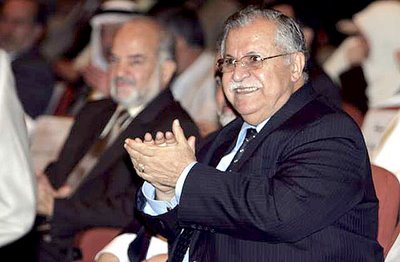 NEW GOVERNMENT: Iraqi President Jalal Talabani applauds as the new Cabinet is approved by the Council of Representatives, Iraq’s parliament, meeting in the Baghdad Convention Center. Photo: Getty images - ht: LA Times
NEW GOVERNMENT: Iraqi President Jalal Talabani applauds as the new Cabinet is approved by the Council of Representatives, Iraq’s parliament, meeting in the Baghdad Convention Center. Photo: Getty images - ht: LA TimesThe Associated Press reporter in this momentous announcement finds it hard to just report the importance of this political milestone ... Iraq - a nation reborn, freely elected and formed for the first time in the history of man.
Nope! It is more important to report and review the violence of those who want to embrace terror against the wishes of the majority in the same announcement report.
Two edits, same report from the AP via Yahoo! News -
Iraq's Parliament Approves New Cabinet By QASSIM ABDUL-ZAHRA, Associated Press Writer - May 20, 2006BAGHDAD, Iraq - Iraq's parliament approved a national unity government Saturday, achieving a goal Washington hopes will reduce violence so U.S. forces can eventually go home.----In a show of hands, the 275-member parliament approved each of the 39 Cabinet ministers proposed by incoming Prime Minister Nouri al-Maliki. The new Shiite Muslim, Sunni Arab and Kurdish ministers then took their oaths of office during the nationally televised session in Baghdad's heavily fortified Green Zone.
The installation, coming after months of political wrangling following Dec. 15 parliamentary elections, completed a democratic process that began after the overthrow of Saddam Hussein's regime in the 2003 U.S.-led invasion.
In his first address, al-Maliki told parliament he would make restoring stability and security the top priority of his new administration. He said he would "work fast" to improve and coordinate Iraqi security forces so they can reduce attacks by insurgent groups and militias.
Al-Maliki also said he would set "an objective timetable to transfer the full security mission to Iraqi forces, ending the mission of the multinational forces."----Al-Maliki, a Shiite, said he would be acting interior minister for now, and he made Salam Zikam al-Zubaie, a Sunni Arab, the temporary defense minister. Deputy Prime Minister Barham Saleh, a Kurd, was made acting minister for national security.
Al-Maliki hopes to fill all three posts with politicians who are independent and have no affiliation with any of Iraq's militias.----Many of Iraq's insurgent groups are Sunni led, and a key goal of the government is to win the support of Sunnis and to recruit as many of them as possible into Iraq's security forces.
The Bush administration hopes the new national unity government of Shiites, Sunnis and Kurds can calm violence and pave the way for beginning the withdrawal of U.S. troops.
In a speech after the inauguration, President Jalal Talabani, a Kurd, predicted that the new government will help his oil-rich country resolve its many problems.
"It will achieve security, stability, peace and prosperity. Working with our people and our allies, this national unity government will purge Iraq of its evil forces, allowing it to once again become independent and prosperous," Talabani said.
The Cabinet includes two women: human rights minister Wijdan Mikaeil, the only Christian chosen, and women's affairs minister Fatin Abdel-Rahman.
The top ministers include Hussain al-Shahristani, a Shiite who will oversee oil; Bayan Jabr, a Shiite in charge of the Finance Ministry; Hoshyar Zebari, a Kurd who is foreign minister; and Abed Falah al-Sudani, a Shiite heading the trade ministry.
The legislative session began about 1:30 p.m., 2 1/2 hours later than planned as al-Maliki held last-minute meetings with other politicians, apparently to hammer out final agreements on some of the Cabinet posts.And this edit of the same report -BAGHDAD, Iraq - Iraq's parliament approved a national unity government Saturday, achieving a goal Washington hopes will reduce violence so U.S. forces can eventually go home. But as the legislators met, a series of attacks killed at least 27 people and wounded dozens.
Police also found the bodies of 21 Iraqis who apparently had been kidnapped and tortured by death squads that plague the capital and other areas. The wounded included two British soldiers whose convoy was hit by a roadside bomb in the southern city of Basra, police said.----But the challenges facing the new government were obvious when al-Maliki was unable to make a final decision about the top three security posts: defense minister, who oversees the Iraqi army; interior minister, who is responsible for police; and minister for national security.
----It was apparent how tough that will be. Before the Cabinet was approved and inaugurated by parliament, legislators turned down a motion by Sunni Arab leader Saleh al-Mutlaq to postpone the session. Al-Mutlaq then walked out with about 10 other Sunni deputies.----U.S. and Iraqi forces didn't impose daytime curfews or ban traffic in Baghdad and major cities, as they did during earlier national elections and a constitutional referendum. But security was heavy in the Green Zone and the capital's airspace was closed to commercial flights at Baghdad's international airport. The government and U.S. officials declined to say why.
Meanwhile, violence continued across the country.
Suspected insurgents set off a bomb hidden in a paper bag in a Shiite district of Baghdad, killing 19 people and wounding 58, police said. The blast occurred near a food stand in Sadr City where men gather to wait for jobs as day laborers, police Maj. Hashim al-Yaser said.
"It was a huge explosion," said Mohammed Hamid, who works in a bakery in the area. "We carried many of the injured to ambulances and helped remove the bodies."
Sadr City is the stronghold of radical Shiite cleric Muqtada al-Sadr, who operates a powerful militia, one of many that exist in the capital outside the control of the government. Al-Maliki hopes to disband such militias and integrate them into the country's military and police.
In the western border town of Qaim, a suicide car bomber killed at least five people and wounded 10 in an attack on a police station, said the head of the local hospital, Hamdi al-Alousi. He did not have any details about the attack.
In the northern city of Mosul, a suicide bomber apparently trying to target a U.S. military convoy instead killed three Iraqi civilians, police Brig. Abdul-Hamid al-Jibouri said.
Police found the bodies of 21 people who apparently had been kidnapped and tortured, six in Baghdad and 15 in Musayyib, about 40 miles south of the capital. All appeared to be victims of death squads that have killed hundreds in sectarian violence, personal vendettas and kidnappings for ransom.Two Reports, No Edits Here>>We all know war is not pretty, but why, now there is an new, freely elected government in Iraq, can't we get reports separated out like we would normally do from a responsible world press? Political Reports about the politics of the new government in Iraq and War Reports about the war on terror, unrest, and the violence in Iraq.
Perspective can be achieved in opinion reports, and clarity of reporting can be achieved by separating out the information for the subject of the actual report.
UPDATE:
Bush Praises Political Progress in Iraq
By NEDRA PICKLER, Associated Press Writer Sun May 21, 10:47 AM ET
WASHINGTON - The inauguration of Iraq's new government marks a new era in relations with the country that the U.S. has occupied for more than three years, President Bush said Sunday.
"The formation of a unity government in Iraq is a new day for the millions of Iraqis who want to live in peace," Bush said. "And the formation of the unity government in Iraq begins a new chapter in our relationship with Iraq."
Bush briefly spoke to reporters from the White House with his wife, Laura, at his side, to highlight the political development without mentioning the violence that still rages in Iraq.
The president did not speak of the spree of bombing, mortar rounds and a drive-by shooting that killed at least 18 Iraqis and wounded dozens — most of them hit by a suicide bomber who targeted a Baghdad restaurant during Sunday's lunch hour.
Bush said he called President Jalal Talabani, Prime Minister Nouri al-Maliki and parliament speaker Mahmoud al-Mashhadani to congratulate them on working together.
"I assured them that the United States will continue to assist Iraqis in the formation of a new country because I fully understand that a free Iraq will be an important ally in the war on terror, will serve as a devastating defeat for the terrorists and al-Qaida and will serve as example for others in the region who desire to be free."Read All>>UPDATE #2 - 1:23 PM, PST:
Iraqi Prime Minister Vows to End Violence
By PATRICK QUINN, Associated Press Writer 1 hour, 44 minutes ago
BAGHDAD, Iraq - Iraq's new prime minister promised Sunday to use "maximum force" if necessary to end the brutal insurgent and sectarian violence wracking the country, while a suicide bomber killed more than a dozen people at a restaurant in downtown Baghdad.
Although he focused on the need to end bloodshed, Nouri al-Maliki also had to address unfinished political negotiations at a Cabinet meeting on the government's first full day in office.Al-Maliki said the appointment of chiefs for the key Defense and Interior ministries should not "take more than two or three days." He is seeking candidates who are independent and have no ties to Iraq's myriad armed groups.The two ministries, which oversee the army and the police, are crucial for restoring stability, and al-Maliki needs to find candidates with wide acceptance from his broad-based governing coalition of Shiites, Sunni Arabs and Kurds.Failure to set the right tone could further alienate the disaffected Sunni Arab minority, which is the backbone of the insurgency. Or it could anger Shiite militias, some of which are thought to number in the thousands."We are aware of the security challenge and its effects. So we believe that facing this challenge cannot be achieved through the use of force only, despite the fact that we are going to use the maximum force in confronting the terrorists and the killers who are shedding blood," al-Maliki said.Read All>>
 Copies of President Bush's and first lady Laura Bush's 2005 tax returns provided by the White House are shown in Washington Friday, April 14, 2006 . Image Credit: AP Photo/Gerald Herbert
Copies of President Bush's and first lady Laura Bush's 2005 tax returns provided by the White House are shown in Washington Friday, April 14, 2006 . Image Credit: AP Photo/Gerald Herbert









